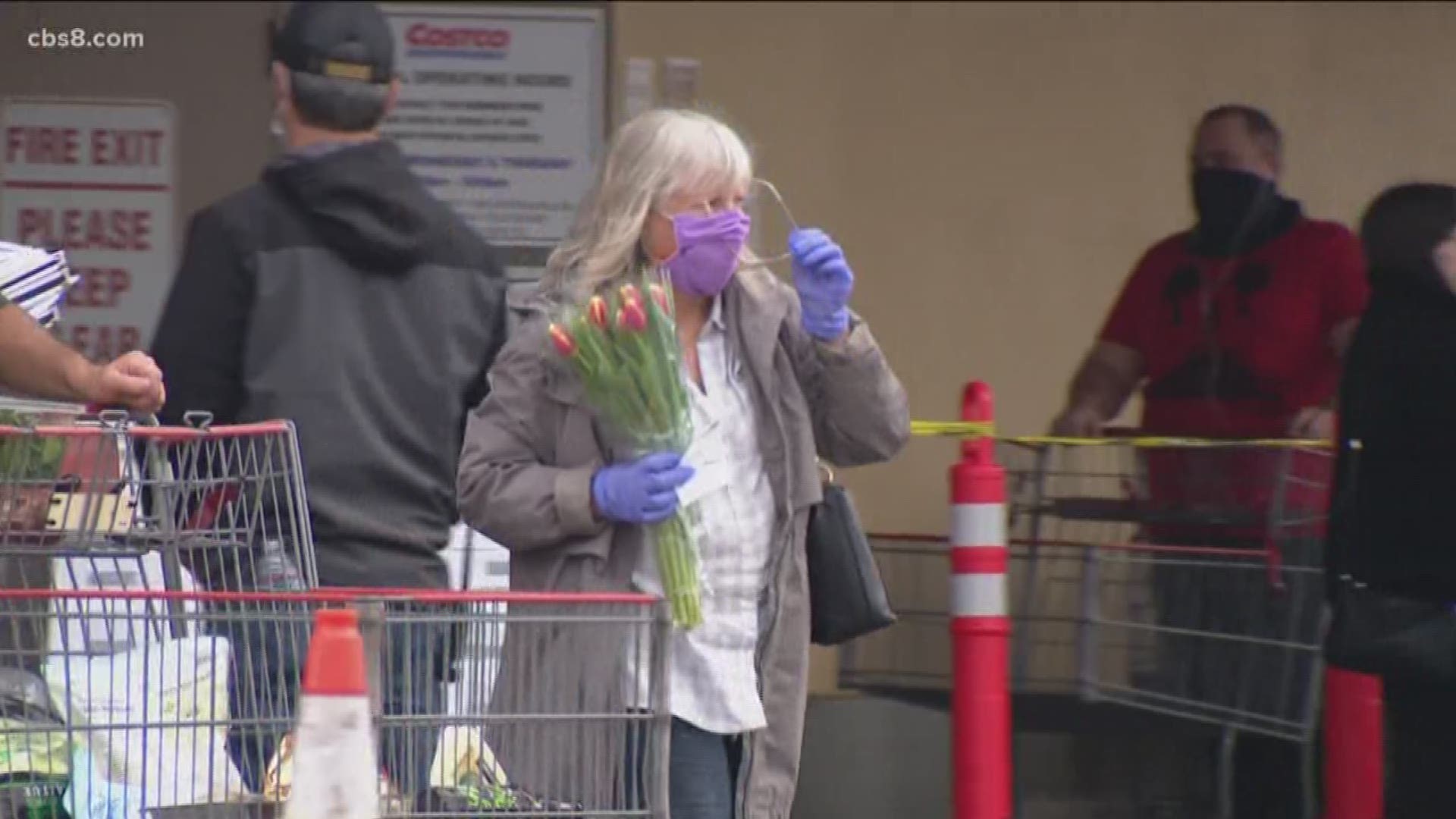SAN DIEGO — During this pandemic, we're all doing what we can to stay safe. For some of us, that includes wearing gloves.
It's not just medical staff wearing gloves. Some of us are wearing them at the grocery store, to pump gas, or even to grab the mail.
While they may make us feel safe, the reality is you could be doing more harm than good.
You may have seen video recently posted to Facebook by a nurse in Michigan. In it, Molly Lixey talks about how wearing gloves can often lead to cross-contamination.
She uses paint to demonstrate.
Which may make you wonder, how safe are gloves during this pandemic?
News 8 spoke with Dr. Jyotu Sandhu, who works in family medicine for Sharp Rees-Stealy.
"It's not gonna protect you anymore if your habits haven't changed," he said.
Dr. Sandhu said while gloves do provide extra protection, they don't take the place of proper hygiene.
"The best course of treatment regardless of gloves is making sure that you're washing your hands, and you're using hand sanitizer," he said.
What about cross-contamination - can gloves transmit viruses?
Yes.
Sandhu said gloves are considered fomites, meaning if you touch something that's infected, the next thing you touch can become infected as well.
"If you grab something and touch something else without knowing you need to change gloves or you're touching multiple things then you're running the risk of contaminating other things," he said.
Like grabbing an item in a grocery store and then touching your cell phone or face.
So, what's the best practice when it comes to wearing gloves?
Change them out often, preferably from one setting to another.
When removing them, make sure you're doing it from the inside out.
"Because the inside isn't contaminated with the outside and then we flip the gloves inside out so your only contact with the gloves is the inside portion of the gloves," said Sandhu.
Still, wash your hands after taking them off.
According to the CDC:
"Gloves may have small defects that are hard to see or maybe torn during use, and hands can become contaminated during removal of gloves."
“Proper hygiene is number one," said Sandhu.
------------------------------------------------------------------------------------
View all News 8 coverage of coronavirus / COVID-19
News 8 has joined forces with The San Diego Foundation to raise immediate, emergency funds for our most vulnerable neighbors in need. Here is how you can help.
We also have a Frequently Asked Questions page we will continue updating with the latest information and reports.
Click here to watch "Facts Not Fear," a News 8 Special on coronavirus from March 26, 2020.
BACKGROUND
According to the CDC, coronavirus (COVID-19) is a family of viruses that is spreadable from person to person. Coronavirus is believed to have been first detected in a seafood market in Wuhan, China in December 2019. If someone is sick with coronavirus, the symptoms they may show include mild to severe respiratory illness, cough, and difficulty breathing.
Currently, there is no vaccine, however, the CDC suggests the following precautions, as with any other respiratory illness:
Know how it spreads
There is no vaccine
The best way to prevent illness is to avoid being exposed to the virus
It is thought to spread mainly from person-person between people in close contact
And believed to be spread by respiratory droplets produced when an infected person coughs or sneezes
Protect yourself
Wash your hands with soap and water for a minimum of 20 seconds
If soap and water aren't available, use hand sanitizer that contains at least 60% alcohol
Avoid touching your eyes, nose, and mouth
Avoid close contact with people who are sick
Put distance between yourselves and others
Protect others
Stay home when you are sick
Wear a facemask if you are sick
Cover your cough or sneeze with a tissue, then throw the tissue in the trash
If you don't have tissue, cough or sneeze into the inside of your elbow
Immediately wash your hands after coughing and sneezing
Clean and disinfect frequently touched objects and surfaces using a regular household cleaning spray or wipe
You can find information on disinfecting and cleaning on the CDC's How to Protect Yourself page.
The California Department of Public Health has issued guidance on the use of cloth face coverings to protect against the spread of the novel coronavirus COVID-19.
The County of San Diego has made face coverings mandatory for those working with the public including grocery stores, pharmacies, gas stations, convenience stores, and similar businesses.
While officials say these face coverings are not a substitute for practices like social distancing and handwashing, there is evidence to suggest that the use of cloth face coverings by the public during a pandemic could help reduce disease transmission. Officials do not recommend the public use N-95 or surgical masks which are needed by health care workers and first responders.

